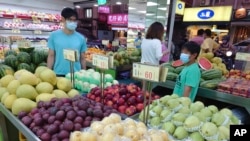Fruit exports are a key issue in Taiwan’s January presidential election in the aftermath of Beijing’s 2021 ban on Taiwanese pineapples.
Since then, China has been limiting imports of Taiwanese fruits as cross-strait tensions have increased, in what appears to be a move to influence the farm vote in favor of the Kuomintang Party (KMT).
The KMT is widely seen as pro-Beijing and thus more likely than the ruling Democratic Progressive Party to secure a reversal of the bans, even though the DPP is traditionally strong in agricultural areas.
But electoral success by the KMT is no guarantee that China will open its markets. Nor is it clear that, if the bans were reversed, Chinese consumers would buy products such as atemoyas and pomelos in pre-pandemic quantities, given the mainland’s sluggish economy, say farmers like Hsieh Tsung-hsien, who grows atemoyas in Taitung.
Hsieh told VOA Mandarin he didn't know which candidate could help farmers, who prioritize selling their crops at a profit over politics.
Chen Chi-chung, Taiwan’s former minister of agriculture, told VOA Mandarin that because agricultural exports and imports are covered by internationally determined, government-controlled quarantine negotiations, the sector is prone to political interference. He said Beijing can reject a Taiwanese product by issuing findings such as "incompatible with international standards" without proof or detailed explanations.
Citing data from the Ministry of Agriculture, Chen Chi-chung said Taiwan's reliance on the Chinese market has dropped significantly. China accounted for 12.9% of Taiwan's fruit exports in 2022, down from 22.9% in 2018. In the same period, the share of Taiwanese fruit sold to China dropped to 3% from 70%.
Chen Chiou-lan, a pomelo farmer in Hualien, echoed Hsieh, telling VOA Mandarin that farmers care only about their crops "being sold at a good price, which will improve our quality of life. So, no matter what kind of policies a candidate proposes, it is more important that they can implement them. Not just a slogan."
That is why the presidential candidates are addressing farmers’ concerns as they campaign. They’re speaking about automating farm tasks and bringing in migrant workers to ease labor shortages in aging Taiwan. They’re setting out their ideas on the cold-chain technology that is used in the transit, processing, storage and display of temperature-sensitive products like fruits; and on marketing and reducing reliance on China, which views self-governing Taiwan as its own territory.
Hsieh said, "The market in Taiwan is actually small and relies on exports, which is also the reality. Fresh fruits do not contain preservatives and will deteriorate during transportation, so I think the cold-chain technology must be applied and improved."
Chen Chi-chung, then agriculture minister, said that after China banned Taiwan's pineapples in March 2021, Taiwan employed its cold-chain systems to open export channels with Japan. In April, Japanese imports of Taiwanese pineapples increased 640% over the prior month, according to Fruitnet, which reported that by May, Taiwanese pineapple imports had increased by more than 800% since the ban.
"These measures stabilized the price of pineapples at the farm gate and ensured farmers’ incomes," said Taiwan’s Agricultural Ministry in a release a year later on April 4, 2022. At that time, the boxes used for shipping pineapples to Japan were in short supply because of COVID-related supply-chain issues and the ministry was touting the use of special pineapple baskets.
The Chinese market was once open to Taiwan’s producers. In 2005, Beijing reduced tariffs on more than 10 varieties of fruit, after KMT Chairman Lien Chan visited China, a first since the anti-communist KMT fled the mainland in 1949 when the communists formed the People’s Republic of China.
Then, in 2021 after the pineapple ban, China banned atemoyas, a U.S.-developed hybrid of a custard apple and a cherimoya, citing an insect infestation. Chen Chi-chung said in a press briefing then that China had no "scientific proof" of that.
China lifted the atemoya ban for those grown in Taitung in June.
Pomelo farmers have also been impacted by the Taiwan Strait fruit standoff. After then-U.S. House Speaker Nancy Pelosi defied China and visited Taiwan in 2022 to support the island’s "vibrant democracy," Beijing banned Taiwanese pomelos. Prices fell and by August 2023, after fertilizer and labor costs increased, Chen Chiou-Lan said some farmers didn’t even bother to harvest their pomelos.
Chen Chiou-lan said most farmers believe the Kuomintang Party will ease the cross-strait tension and help export agricultural products to China.
However, if the DPP remains in power, the pomelo farmers worry Taiwan's agricultural products may face more export restrictions. She said the only solution is to rely on the government to expand overseas marketing channels.
Adrianna Zhang contributed to this report.




